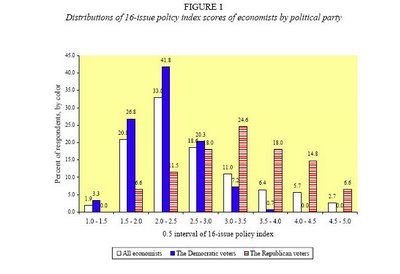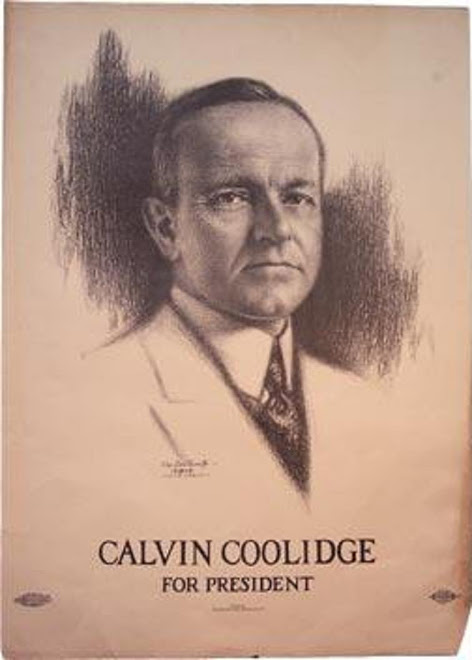Monday, November 27, 2006
About This Blog
But there is more to life than the political and economic framework in which it is lived. There is life itself: humanity (in all its dignity and disarray) and the enjoyment of nature, the arts (musical, dramatic, and representational), sports (especially baseball), and so on; there are science and religion, and their implications for the meaning of life. Liberty Corner gives much attention to those subjects, as well to politics and economics.
This blog is not a journal; it is a compendium of my considered views on a wide range of topics. Some of those views evolved during my blogging lifetime. In particular, my views about the nature of liberty and the conditions under which it is possible, matured from knee-jerk anti-statism to Burkean-Hayekian conservatism. (See, for example, "On Liberty in the sidebar.)
I remain anonymous because, like Ebenezer Scrooge, I wish to be left alone. I am not anonymous for the purpose of feigning unwarranted expertise; my credentials are fully on view at "About the Author." The merits of my writings can be judged by their empirical and logical validity, and have nothing to do with my identity.
I have left a blogroll in place, but have pared it to those 46 blogs and syndicators whose feeds I would read were I still reading feeds. But keeping abreast of blogdom, like blogging, is in my past.
I thank Postmodern Conservative for his contributions to this blog, especially in the months following my final substantive post. Now that he has retired from the fray, it is time for me to say adieu.
Sunday, November 26, 2006
An Immigration Roundup
Saturday, November 11, 2006
Pride and Prejudice on Film
I have now seen four film versions of Jane Austen's Pride and Prejudice. Last night I had the extreme pleasure of viewing for the first time the earliest and best of the four: the 117-minute, 1940 release starring Greer Garson as Elizabeth Bennet and Laurence Olivier as Mr. Darcy. The 1940 version shows Hollywood at its finest. Great actors delivering great lines with panache and wit in a lavish, tightly orchestrated, and fast-paced production that demands -- and deserves -- your full attention.
Garson and Olivier, in particular (but not exclusively), outshine their counterparts in the other productions that I have seen. Garson may have been "too old" (36 at the time the film was released) but who cares? She is now my image of Elizabeth Bennet: witty, cunning, cutting, forthright -- and beautiful as well. Olivier (33 at the time of release) simply exudes Darcy: stubborn, prideful, haughty -- and yet vulnerable and kind behind the facade.
The other three versions that I have seen all are commendable for various reasons. They are:
1995 (300-minute mini-series), starring Jennifer Ehle and Colin Firth -- excellent performances delivered at a more thoughtful pace than that afforded by a feature film, and in realistic settings (as opposed to the gaudy faux-rusticism of the 1940 version)
1980 (265-minute mini-series), starring Elizabeth Garvie and David Rintoul -- somewhat stiff performances in a production clearly (and successfully) aimed at recreating the time and place of which Austen wrote
2005 (127-minute feature film), starring Keira Knightley and Matthew Macfadyen -- a mixed bag of performances (e.g., Knightley is good, if too juvenile; Macfadyen is a nothing) in a feature film that achieves more "realism" than the 1940 version.
Wednesday, November 08, 2006
Throw the Rascals In
The outcome of yesterday's elections can be summed up in the phrase "throw the rascals in." That's, of course, an ironic variation on the usual expression of voter dissatisfaction with incumbents, which is to "throw the rascals out."
A marginal minority of voters having "thrown the rascals in," all Americans now face at least two years of Democrat control of the House (and probably the Senate), from which will emanate efforts to
- raise taxes
- "solve" the nature-made problem of global warming
- "solve" the non-existent "crisis" in health care by passing measures that will drive health-care providers out of business and deter drug companies from investing in research and development
- duck the very real crisis in entitlement spending
- otherwise try to legislate and regulate the conditions of our existence in ways that penalize hard work, law-abidingness, entrepreneurship, and the accidents of having been born white and/or male and/or straight and/or of American-born parents --
- all while trying to surrender to our enemies by giving up the fight abroad and by granting them the same constitutional rights as the very Americans whom they are trying to kill.
The only silver lining in this very dark cloud is that President Bush can -- if he is willing -- wield the veto pen. Two years of gridlock would indeed be a blessing, for the federal government might actually do less to screw up our lives and the lives of our progeny. But I do fear for the war effort, especially because our enemies undoubtedly have been emboldened by the prospect of a Congress that is controlled by an anti-war faction. And I also fear that President Bush, facing a hostile Senate, will be unable to appoint constitutionalists to succeed Justices John Paul Stevens and Ruth Bader Ginsburg, both of whom are likely to postpone retirement in the hope that Bush is succeeded by a Democrat.
I am as worried about the future of the country as I was -- justifiably -- when Jimmy Carter won the election of 1976. My only hope is that the Leftist agenda of congressional Democrats will frighten Americans and induce an electoral backlash that brings pro-defense, small-government Republicanism to power in 2008. All we need are some small-government Republicans.
Tuesday, November 07, 2006
I'm a Sponsor
Monday, November 06, 2006
More Names
The Social Security Administration publishes a list of the names most commonly given to newborns. Here are last year's top ten:
| Rank | Male name | Female name | ||
|---|---|---|---|---|
| 1 | Jacob | Emily | ||
| 2 | Michael | Emma | ||
| 3 | Joshua | Madison | ||
| 4 | Matthew | Abigail | ||
| 5 | Ethan | Olivia | ||
| 6 | Andrew | Isabella | ||
| 7 | Daniel | Hannah | ||
| 8 | Anthony | Samantha | ||
| 9 | Christopher | Ava | ||
| 10 | Joseph | Ashley | ||
| Note: Rank 1 is the most popular, rank 2 is the next most popular, and so forth. | ||||
You can follow the above link and see, for example, the top 1000, which includes Tyler (#16 as a boy's name, #764 as a girl's name) and Madison (#3 as a girl's name). Which leads me to think of president's last names that have been given to some famous, infamous, and semi-famous persons as first names (though often without reference to the President being honored or dishonored):
- Washington (Irving, author of "The Legend of Sleepy Hollow," which engendered the terrible movie starring Johnny Depp and Christina Ricci)
- Jefferson (Davis, leader of "The Lost Cause")
- Madison (Kuhn, obscure historian -- but not a girl)
- Jackson (Pollock,
artistdribblerpainter) - Harrison (Ford,
still lifecar dealerfilm actor) - Tyler (Mathieson, of CNBC)
- Taylor (Booth, computer scientist and namesake of an education award)
- Pierce (Brosnan, ex-007)
- Lincoln (Chafee, Republican in Name Only)
- Grant (Hull, founder of Enabled Solutions -- never heard of him or it, but I found his name here)
- Hayes (Milam, a security guard at the think-tank at which I worked, for about as long I worked there, which was 30 years)
- Arthur (Godfrey, entertainer/radio-TV host remembered mainly for playing the ukulele, buzzing the control tower at Leesburg, Virginia, airport, and firing singer Julius La Rosa on the air)
- Cleveland (Amory, cat lover and writer)
- Roosevelt (Grier,
immovable objectdefensive lineman) - Wilson (Pickett, recently departed R&B and soul singer)
- Truman (Capote, American
poofwriter) - Ford (Madox Ford, English
aesthetewriter) - Carter (Stanley, Ralph's very late brother)
- Reagan (Dunn, member of the King County, Wash., council and son of former U.S. Representative Jennifer Dunn)
- Clinton (Eastwood,
still lifefilm actor -- bet you didn't think of him as a "Clinton")
By my reckoning that leaves
- Adams (not to be confused with Adam; John wasn't the first "man")
- Monroe (cooler than Madison)
- Van Buren (way cool)
- Polk (might be mistaken for an invitation)
- Fillmore (for fatties)
- Buchanan (pronounce it properly: "buck-an-un")
- Johnson (don't go there)
- McKinley (very preppie)
- Taft (ditto)
- Harding (double ditto)
- Coolidge (triple ditto)
- Eisenhower (no parent should do this)
- Kennedy (déclassé, an instant Tiffany or Brittany)
- Nixon (the American Adolf)
- Bush (absolutely don't go there)
Any takers?
Sunday, November 05, 2006
Trans-Gendered Names
Long before girls began to acquire trendy, unisex names like McKenna, Morgan, Payton, and Taylor -- an improvement on Brandi, Brittany, and Tiffany -- they had already claimed ownership of many formerly masculine names; for example:
- (George) Beverly (Shea), composer and singer of religious songs, long associated with Billy Graham
- (Arthur) Evelyn (St. John Waugh), English writer
- Marion (Morrison), a.k.a. John Wayne
- Meredith (Willson), American composer (e.g., The Music Man)
- Merle ("Punk" O'Rourke), my father's uncle by marriage, and an outstanding semi-pro pitcher
Saturday, November 04, 2006
A Small Circle of Stars
Evelyn Waugh was born in 1903; Katharine Houghton Hepburn, four years later. Of Waugh's novels that were adapted to film, Hepburn appeared in but one: Love Among the Ruins.
Hepburn's co-star in Love Among the Ruins, Laurence Olivier, starred also in a mini-series based on Waugh's Brideshead Revisited...
...which co-starred, among others, Jeremy Irons of The Merchant of Venice (2004).
Merchant featured Allan Corduner, a.k.a. Sir Arthur Sullivan of Topsy-Turvy, the co-star of which (Jim Broadbent as W.S. Gilbert) was in Widow's Peak with Natasha Richardson...
...whose mother (and co-star in The White Countess), Vanessa Redgrave, appeared in the play A Madhouse in Goa with Rupert Graves.
And Graves starred in the film adaptation of Waugh's A Handful of Dust.Wordplay
There is laughter in slaughter, but there ought to be naught.
When rain is naught there is a drought, the thirst of which can be quenched by a draught.
Enough is enough, especially when it's a cough that comes with a cold caught by sitting in a draught.
When the wind soughs the boughs wave gently.
He bends before her in a deep bow before sloughing his coat and bending his bow to take aim at a bough on a tree that stands in a distant slough.
A daughter's laughter softens even a rough, tough crofter.Friday, November 03, 2006
All That Jazz
An otherwise sensible blogger (whom I'll not name) adores Miles Davis. He (the blogger) says, "If you listen to nothing else by Miles Davis, buy and listen to Relaxin’. I absolutely guarantee you will not hate it, and you are very likely to love it."
Well, I refreshed my memory of the Davis oeuvre by listening to a few cuts from Relaxin' via Amazon.com. I absolutely hate it; it's pablum for the ears. It reminds me of the background music for Peanuts films. Maybe it is the background music for Peanuts films.
Wherever jazz went after the late 1930s, it wasn't a good place. Davis's stuff is better than the dithering, discordant offerings of other post-war jazz "artists" whose names will not (dis)grace this blog. But that's like saying a bowlful of sugar is better for you than a bowlful of arsenic. It is, but why eat either when the jazz pantry is stocked with the nutritious, flavorful pre-war offerings of Louis Armstrong, Sidney Bechet, Bix Beiderbecke, Benny Goodman, Fletcher Henderson, Jimmie Lunceford, Jelly Roll Morton, King Oliver, Kid Ory (heard here with his post-war group but in pre-war form), the Quintette of the Hot Club of France (featuring Django Reinhardt and Stéphane Grappelli), Fats Waller, and the "smooth" but always listenable Paul Whiteman. They are among the many greats to be found at The Red Hot Jazz Archive. Go there. It's a toe-tapping, foot-stomping treat.Wednesday, November 01, 2006
Roofs I Have Worked Under
1. The two grocery stores in my home town where I worked when I was a senior in high school and during the summer following my freshman year in college.

2. The headquarters of a division of GM, where I worked in the accounting department during the summer following my sophomore year in college.

3. The home of the economics department at my undergraduate school, where I was a research assistant as a senior.

4. The sites of the first two office buildings where I worked for the defense think-tank by which I was employed for a total of 30 years. The site on the right is occupied by a newer, larger building than the one I worked in. The site on the left is occupied by the original building.

5. The Pentagon, where I endured almost two years as a "whiz kid," between stints at the think tank. After leaving the Pentagon I returned to the building on the left in photo #4.

6. The site of the building in New York State where we had a small business for almost three years.

7. The building occupied by the defense think-tank upon my return to it following the New York sojourn. The building is on the northern edge of a park-like office campus, most of which lies across the street that cuts across the picture.

8. The next building occupied by the defense think-tank -- an inferior building in an inferior location -- into which we were forced by a political deal. I spent a lot of my time making arrangements to move us back to the office park. (See #10.)

9. Cato Institute's building in Washington, D.C., where I worked part-time -- for fun, not money -- after my retirement from the defense think-tank.

10. The current home of the defense think-tank. It is in the same office park as the building shown in photo #7, but #10 gives a better view of the grounds, most of which are dedicated to a nature preserve. I planned the building and negotiated the lease before I retired from the think-tank, where I had been director of finance and administration. The think-tank moved to its current home after I retired.

Sunday, October 29, 2006
Roofs I Have Lived Under
1. The house in which my parents lived when I was born was to the left of the green arrow. It has been swallowed by a community college.

2. The house to which my parents moved when I was about 18 months old.

3. My parents then moved to this house for a year.

4. They then bought this house (the first they owned), and lived there four years.

5. Then there's this bigger house that my parents owned and lived in for 37 years. I went off to college while they lived there.

6. I lived in this dormitory during my freshman and sophomore years at Big-Ten U.

7. I shared an apartment during my junior year. The house, which was only a block from campus, seems to have been replaced by a parking lot.

8. As a senior, I had a room in a decrepit house several blocks from campus. It seems to have been replaced by a commercial building of some kind.

9. During my brief tenure at an eastern grad school -- from which I withdrew because I could not stand it -- I shared an apartment in this building.

10. On my return to Big-Ten U for the balance of the academic year, I had a room in a house just a few blocks from campus. The site seems to have been taken over by an office building and parking lot.

11. This building housed my first apartment in Virginia, where I went to work after leaving grad school. I had the aparttment for a year.

12. My wife and I lived in this apartment building for the first year of our marriage.

13. We then lived in this building for two years.

14. We rented this house for two years.

15. And then we had this house built, and lived there for seven years. I have cropped the photo to encompass, roughly, the 4+ acre lot on which the house sits. A later owner enclosed the deck and screened porch that I single-handedly added to the house. (The enclosed addition can be seen the lower-right corner of the house.) The pond at the lower left corner of photo was added by a later owner; we kept a garden in that location.

16. During our sojourn in New York State we rented this house for about two years.

17. We then bought and lived in this house for about a year before returning to Virginia. (For more about this house, see "My Old Sears Home.")

18. We lived in this parkside house for 24 years -- long enough to enlarge it by about 50 percent and thoroughly renovate the original portion, inside and out. Our real-estate agent listed it as "the jewel on the park."

19. Three years ago we opted for the warmth and sunshine of central Texas, where we were lucky enough to find this house on a wooded hillside lot.

Finally, there's Grandma's house. Luckily the satellite shot of her village was taken before the house was torn down to make way for a much larger house.

Generations
Here is a good summary of Generations: The History of American's Future, 1589 to 2069, which I read 10-15 years ago. The authors' historiographic technique consists of after-the-fact generalizations that lead them to conclude that there are four basic generational personalities, which occur in repetitive cycles. It is those cycles that dictate the course of American history -- according to the authors.
The generational analysis is of dubious value, because of its reductionism. Human nature and history just aren't that simple. But the analysis does provide a hook on which to hang a neat summary of American history. The book is worth reading for its unique perspective on that history, not for its pseudo-scientific explanation of it.
Pennant Winner vs. Best Team
With the ascension of the wild-card Detroit Tigers and mediocre St. Louis Cardinals (83-78 WL record) to their respective league championships in 2006, and with the triumph of the wild-card Colorado Rockies in 2007, it's time to take stock of divisional play and the wild-card designation. Since the advent of divisional play in 1969, and especially with the introduction of wild-card teams in 1995, league championships often have not been won by the best team. Here's the whole story:
From 1901 (the American League's first year) through 2006 each league has had 106 champions (with the outcome of this year's AL race still pending). (There were no champions in 1994, when the baseball season ended early because of a players' strike.) From 1901 through 1968 each league's champion was the team with the best regular-season record; there were postseason playoffs only when two teams tied for the league's best record.
From 1969 onward the leagues have been split into divisions, and league championships have been determined by postseason play. League championships were determined in one round of postseason play from 1969 through 1993, when there were only two divisions in each league. (There was an exception in 1981, when a midseason strike led to the declaration of "first half" and "second half" winners in each leagues' two divisions. That necessitated an extra round of postseason play to determine overall division champions.)
From 1995, the first year of postseason play after each league was split into three divisions, it has taken two rounds of postseason play to determine a league's champion. The extra round accommodates the addition of a third division champion and a "wild card" team -- the second-place team with the best record among the three second-place teams in a league.
Twenty-one times in the 39 seasons of regular postseason play (1969-2007, less 1994), the National League pennant has been won by a team that did not have the best regular-season record. The same thing has happened 16 times in the American League, through 2006. It is because of such results that I have expressed (elsewhere) my disdain of postseason play as an indicator of excellence.
The following tables summarize the results for each team. The first pair of tables gives the number of times, beginning with 1901, that each team has led its league in championships and had the best record. The second pair indicates the years in which a team won its championships and whether or not it also had the league's best record in those years. (Franchises that have been located in more than one place (e.g., the Los Angeles Dodgers) are identified by their current location.)
NATIONAL LEAGUE - CHAMPIONSHIPS/BEST RECORD/NUMBER OF SEASONS (FIRST SEASON*) - 1901-2007
Arizona: 1/1/10 (1998)
Atlanta: 9/13/107
Chicago: 10/12/107
Cincinnati: 9/9/107
Colorado: 1/0/15 (1993)
Florida: 2/0/15 (1993)
Houston: 1/2**/46 (1962)
Los Angeles: 18/16/107
Milwaukee: 0/0/10 (1998)
New York: 4/4/46 (1962)
Philadelphia: 5/3/107
Pittsburgh: 9/12/107
San Diego: 2/0/39 (1969)
San Francisco: 18/17/107
St. Louis: 17/18**/107
Washington: 0/1***/39 (1969)
__________
* If not in the league in 1901.
** Houston and St. Louis tied for best record in 2001.
*** Montreal (now Washington) had the best record in the strike-shortened 1994 season.
AMERICAN LEAGUE - CHAMPIONSHIPS/BEST RECORD/NUMBER OF SEASONS (FIRST SEASON*) - 1901-2007
Baltimore: 7/9/107
Boston: 12/10****/107
Chicago: 6/8/107
Cleveland: 5/6****/107
Detroit: 10/10/107
Kansas City: 2/1/39 (1969)
Los Angeles: 1/0/47 (1961)
Milwaukee (as AL team): 1/1/30 (1969-97)
Minnesota: 6/5/107
New York: 39/39***/107
Oakland: 15/16**/107
Seattle: 0/1/31 (1977)
Tampa Bay: 0/0/10 (1998)
Texas: 0/0/47 (1961)
Toronto: 2/3**/31 (1977)
__________
* If not in the league in 1901.
** Oakland and Toronto tied for best record in 1992.
*** New York had the best record in the strike-shortened 1994 season.
**** Boston and Cleveland tied for best record in 2007.
NATIONAL LEAGUE - YEARS IN WHICH EACH TEAM WON THE CHAMPIONSHIP
Arizona Diamondbacks* (1 league championship)
2001 (best record: Houston and St. Louis tied)
Atlanta Braves (formerly Milwaukee Braves and Boston Braves) (9)
1914, 1948, 1957, 1958, 1991 (best record: Pittsburgh), 1992, 1995, 1996, 1999Chicago Cubs (10)
1906, 1907, 1908, 1910, 1918, 1929, 1932, 1935, 1938, 1945
Cincinnati Reds (9)
1919, 1939, 1940, 1961, 1970, 1972 (best record: Pittsburgh), 1975, 1976, 1990 (best record: Pittsburgh)Colorado Rockies* (1)
2007 (best record: Arizona)Florida Marlins* (2)
1997 (best record: Atlanta), 2003 (best record: Atlanta)Houston Astros (also Houston Colt 45s)* (1)
2005 (best record: St. Louis)Los Angeles Dodgers (formerly Brooklyn Dodgers, Brooklyn Robins, and Brooklyn Superbas) (18)
1916, 1920, 1941, 1947, 1949, 1952, 1953, 1955, 1956, 1959, 1963, 1965, 1966, 1974, 1977 (best record: Philadelphia), 1978, 1981 (best record: Cincinnati), 1988 (best record: New York)Milwaukee Brewers* (0) (see also AL listing)
New York Mets* (4)
1969, 1973 (best record: Cincinnati), 1986, 2000 (best record: San Francisco)Philadelphia Phillies (5)
1915, 1950, 1980 (best record: Houston, 1983 (best record: Los Angeles), 1993 (best record: Atlanta)Pittsburgh Pirates (9)
1901, 1902, 1903, 1909, 1925, 1927, 1960, 1971, 1979San Diego Padres* (2)
1984 (best record: Chicago), 1998 (best record: Atlanta)San Francisco Giants (formerly New York Giants) (18)
1904, 1905, 1911, 1912, 1913, 1917, 1921, 1922, 1923, 1924, 1933, 1936, 1937, 1951, 1954, 1962, 1989 (best record: Chicago), 2002 (best record: Atlanta)St. Louis Cardinals (17)
1926, 1928, 1930, 1931, 1934, 1942, 1943, 1944, 1946, 1964, 1967, 1968, 1982, 1985, 1987, 2004, 2006 (best record: New York)Washington Nationals (formerly Montreal Expos)* (0)
AMERICAN LEAGUE - YEARS IN WHICH EACH TEAM WON THE CHAMPIONSHIP
Baltimore Orioles (formerly St. Louis Browns and original Milwaukee Brewers) (7)
1944, 1966, 1969, 1970, 1971, 1979, 1983 (best record: Chicago)Boston Red Sox (12)
1903, 1904, 1912, 1915, 1916, 1918, 1946, 1967, 1975 (best record: Oakland), 1986, 2004 (best record: New York), 2007 (best record: tied with Cleveland)Chicago White Sox (6)
1901, 1906, 1917, 1919, 1959, 2005Cleveland Indians (also Cleveland Naps, Cleveland Bronchos, and Cleveland Blues) (5)
1920, 1948, 1954, 1995, 1997 (best record: Baltimore)
Detroit Tigers (10)
1907, 1908, 1909, 1934, 1935, 1940, 1945, 1968, 1984, 2006 (best record: New York)
Kansas City Royals* (2)
1980 (best record: New York), 1985 (best record: Toronto)
Los Angeles Angels of Anaheim (formerly Anaheim Angels, California Angels, and Los Angeles Angels) * (1)
2002 (best record: New York)Milwaukee Brewers (now NL; formerly Milwaukee Brewers (AL) and Seattle Pilots (AL))* (1)
1982Minnesota Twins (formerly the original Washington Senators) (6)
1924, 1925, 1933, 1965, 1987 (best record: Detroit), 1991New York Yankees (formerly New York Highlanders and original Baltimore Orioles) (39)
1921, 1922, 1923, 1926, 1927, 1928, 1932, 1936, 1937, 1938, 1939, 1941, 1942, 1943, 1947, 1949, 1950, 1951, 1952, 1953, 1955, 1956, 1957, 1958, 1960, 1961, 1962, 1963, 1964, 1976, 1977 (best record: Kansas City), 1978, 1981 (best record: Oakland), 1996 (best record: Cleveland), 1998, 1999, 2000 (best record: Chicago), 2001 (best record: Seattle), 2003Oakland Athletics (formerly Kansas City Athletics and Philadelphia Athletics) (15)
1902, 1905, 1910, 1911, 1913, 1914, 1929, 1930, 1931, 1972, 1973 (best record: Baltimore), 1974 (best record: Baltimore), 1988, 1989, 1990Seattle Mariners* (0)
Tampa Bay Devil Rays* (0)
Texas Rangers (formerly expansion Washington Senators)* (0)
Toronto Blue Jays* (2)
1992 (best record: tied with Oakland), 1993
Saturday, October 28, 2006
Deer Blogging





The Meaning of the World Series
UPDATED, 10/28/07
The World Series doesn't decide the best team in baseball.
The World Series -- like the playoffs that precede it -- is nothing more than a expanded regular-season series. Teams play dozens of regular-season series in order to qualify for postseason play. If it takes dozens of such series to determine which teams are qualified for postseason play (i.e., the "best" teams), how can the World Series and the playoffs that precede it determine the "very best" of the "best"? Logically, the teams involved in postseason series would have to play each other many, many times before one of them could claim to be the "very best."
The meaninglessness of postseason play is demonstrated by the inclusion of wild-card teams. After 162 regular-season games, a team that has finished second in its division suddenly has a chance to "prove" that it is really baseball's best team. That is, it is allowed to "prove" in three brief rounds of postseason play what it failed to prove in 162 games. The result: wild-card teams have won four of the thirteen World Series played since their inclusion in postseason play.
Over that span (1995-2007), the World Series has been won eight times by a team with a worse regular-season record than that of its opponent. Moreover, 37 of the 78 postseason series between teams in the same league -- the Division Championship Series and League Championship Series -- have been won by the team with a worse regular-season record than that of its opponent. Luck, not skill, seems to have a strong hand in determining the outcome of postseason play.
Postseason play is -- above all else -- a way of filling seats, selling concessions, and selling broadcast rights. It delivers often-exciting games between baseball's better teams. A series that goes down to the wire and is filled with exciting games is a baseball fan's delight. But none of that has anything to do with deciding which of baseball's teams is the best.Thursday, October 19, 2006
The Military Commissions Act of 2006
President Bush has signed the act into law. John Yoo has some choice things to say about it:
The new law is, above all, a stinging rebuke to the Supreme Court. It strips the courts of jurisdiction to hear any habeas corpus claim filed by any alien enemy combatant anywhere in the world. It was passed in response to the effort by a five-justice majority in Hamdan v. Rumsfeld to take control over terrorism policy. That majority extended judicial review to Guantanamo Bay, threw the Bush military commissions into doubt, and tried to extend the protections of Common Article 3 of the Geneva Conventions to al Qaeda and Taliban detainees, overturning the traditional understanding that Geneva does not cover terrorists, who are not signatories nor "combatants" in an internal civil war under Article 3.
Hamdan was an unprecedented attempt by the court to rewrite the law of war and intrude into war policy.....
Until the Supreme Court began trying to make war policy, the writ of habeas corpus had never been understood to benefit enemy prisoners in war. The U.S. held millions of POWs during World War II, with none permitted to use our civilian courts (except for a few cases of U.S. citizens captured fighting for the Axis). Even after hostilities ended, the justices turned away lawsuits by enemy prisoners seeking to challenge their detention. In Johnson v. Eisentrager, the court held that it would not hear habeas claims brought by alien enemy prisoners held outside the U.S., and refused to interpret the Geneva Conventions to give new rights in civilian court against the government. In the case of Gen. Tomoyuki Yamashita, the court refrained from reviewing the operations of military commissions.
In Hamdan, the court moved to sweep aside decades of law and practice so as to forge a grand new role for the courts to open their doors to enemy war prisoners. Led by John Paul Stevens and abetted by Anthony Kennedy, the majority ignored or creatively misread the court's World War II precedents. The approach catered to the legal academy, whose tastes run to swashbuckling assertions of judicial supremacy and radical innovations, rather than hewing to wise but boring precedents....
...[E]nemy combatants who fight out of uniform, such as wartime spies, have always been considered illegals under the law of war, not entitled to the same protections given to soldiers on the battlefield or ordinary POWs. Disguised suicide- bombers in an age of WMD proliferation and virulent America-hatred are more immediately dangerous than the furtive information-carriers of our Cold War past. We now know that more than a dozen detainees released from Guantanamo have rejoined the jihad. The real question is how much time, energy and money should be diverted from winning the fight toward establishing multiple layers of review for terrorists. Until Hamdan, nothing in the law of war ever suggested that enemy status was anything but a military judgment....
This time, Congress and the president did not take the court's power grab lying down. They told the courts, in effect, to get out of the war on terror, stripped them of habeas jurisdiction over alien enemy combatants, and said there was nothing wrong with the military commissions. It is the first time since the New Deal that Congress had so completely divested the courts of power over a category of cases. It is also the first time since the Civil War that Congress saw fit to narrow the court's habeas powers in wartime because it disagreed with its decisions.
The law goes farther. It restores to the president command over the management of the war on terror. It directly reverses Hamdan by making clear that the courts cannot take up the Geneva Conventions. Except for some clearly defined war crimes, whose prosecution would also be up to executive discretion, it leaves interpretation and enforcement of the treaties up to the president. It even forbids courts from relying on foreign or international legal decisions in any decisions involving military commissions.
All this went overlooked during the fight over the bill by the media, which focused on Sens. McCain, Graham and Warner's opposition to the administration's proposals for the use of classified evidence at terrorist trials and permissible interrogation methods. In its eagerness to magnify an intra-GOP squabble, the media mostly ignored the substance of the bill, which gave current and future administrations, whether Democrat or Republican, the powers needed to win this war.
Imagine that. The commander-in-chief -- not a majority of the Supreme Court -- will command the armed forces.
Evidence that Congress did the right thing can be found in the insane, Left-wing rhetoric of Keith Olbermann, who last night said this:
For, on this first full day that the Military Commissions Act is in force, we now face what our ancestors faced, at other times of exaggerated crisis and melodramatic fear-mongering: A government more dangerous to our liberty, than is the enemy it claims to protect us from. [Thanks to John McIntyre at RCP Blog for the quotation.]
Olbermann has evolved over the years from witty sportscaster to moon-maddened opponent of anything and everything that would bring our enemies to heel. He cannot see -- or chooses not to see -- the difference between foreign enemies and criminal suspects. In that respect, he is typical of our domestic enemies in the Democrat Party.
Related posts:
American Royalty
Torture and Morality
A Rant about Torture
Taking on Torture
Losing Sight of the Objective
The Best Defense . . .
Reaching the Limit?
Terrorists' "Rights" and the Military Commissions Act of 2006
Wednesday, October 18, 2006
300,000,000 and Growing
Among the seven main causes of economic growth that I discuss here is population growth, which
means more people to work "hard" and "smart"; more output that can be saved and invested; more inventors, innovators, and entrepreneurs whose activities can be leveraged into greater per-capita output; and a multiplication of opportunities for beneficial voluntary exchange.
As I observe here, population growth is a testament to the ability of the human race to provide for itself. What is relevant is not that some people today live in wealth while many more live in poverty, but that human beings -- on the whole -- are far better off than they were 100, 1,000, and 10,000 years ago. Thus:
Estimates for -400 through 1800 are from U.S. Census Bureau, "Historical Estimates of World Population"; estimate for 2000 is from U.S. Census Bureau, "Total Midyear Population for the World: 1950-2050." Year 1 is plotted as Year 0 for ease of illustration. "Upper" estimates are used for -400 through 1800 (where given) because those estimates are taken from a series that extends from -10000 through 1950, and the upper estimate for 1950 in that series agrees with the estimate for 1950 in the series for 1950-2050.
Tuesday, October 17, 2006
More Quick Takes
 Read the whole post. Then read this, and follow the links. See also this piece by Debra Saunders.
Read the whole post. Then read this, and follow the links. See also this piece by Debra Saunders.
* * *
Donald Boudreaux explains, once again, why making healthcare a "right" will only make it more expensive and harder to come by.
* * *
Selwyn Duke's "The Fascists among Us," at The American Thinker, reminds me of my post, "Calling a Nazi a Nazi." P.S. There's also Thomas Sowell's "Can we talk?" at Townhall.com.
* * *
Related to that, there's wide support among Democrats -- those "tolerant" people -- for the "outing" of gay Republicans. (See this post at Patterico's Pontifications.) It's the old Leftist double standard: The only good gay is a Democrat gay; Bill Clinton couldn't have been guilty of sexual harrassment because his "heart was in the right place"; the only "stolen" elections are those won by Republicans, even though Democrats are past masters at the art of stealing elections; etc., etc., etc.
* * *
Speaking of Democrats, read this post by Ed Lasky at The American Thinker, which opens thusly: "Jihadists admit they are killing for the the camera and for the Democrats."
* * *
Tyler Cowen (Marginal Revolution) asks "Why hasn't Mexico done better?" Perhaps because it's not populated by immigrants from the British Isles and Northern Europe, and their descendants, whose political and economic leadership brought liberty and prosperity to the United States.
Monday, October 16, 2006
28 Months for Treason?
Captain Ed reports:
A federal judge sentenced [attorny Lynne] Stewart to 28 months in prison for assisting Omar Abdel Rahman in activating his terrorist network while the US held him in custody -- and then temporarily released her on her own recognizance:
A firebrand civil rights lawyer who has defended Black Panthers and anti-war radicals was sentenced Monday to nearly 2 1/2 years in prison — far less than the 30 years prosecutors wanted — for helping an imprisoned terrorist sheik communicate with his followers on the outside. ...
The judge said Stewart was guilty of smuggling messages between her client and his followers that could have "potentially lethal consequences." He called the crimes "extraordinarily severe criminal conduct."
But in departing from federal guidelines that called for 30 years behind bars, he cited Stewart's more than three decades of dedication to poor, disadvantaged and unpopular clients.
"Ms. Stewart performed a public service, not only to her clients, but to the nation," Koeltl said.
The judge said Stewart could remain free while she appeals, a process that could take more than a year.
This woman sent messages to Rahman's followers in Egypt that instructed them to begin terrorist activity. She knew exactly what she did -- after all, she had defended Rahman and had seen the evidence against him -- and turned her back on her country and her humanity in order to suck up to a man who plotted the murder of tens of thousands of Americans. Stewart's actions could easily have led to the deaths of many innocent civilians.
Despicable. Both Judge Koetl and Lynne Stewart, that is. There is no excuse for a sentence of less than 30 years, certainly not the excuse given by Judge Koetl. And why is the judge allowing the woman to go free, pending appeal? She will either abscond to Pakistan, to be with Osama, or find new ways to betray her country, right here at home.
It's telling that Stewart gave "more than three decades of [service] to poor, disadvantaged and unpopular clients." Lawyers like that aren't really altruists who are dedicated to their clients. They're malcontents who are dedicated to the subversion of the rule of law by playing the criminal-as-victim card.
Had I been prosecuting the case I would have gone for a charge of treason and the death penalty. Perhaps Stewart might have "pled out" to a 30-year sentence, to be served with hardened criminals -- not at a "country club" for white-collar criminals.
The outcome of Stewart's case reminds me of the grave mistake made by the U.S. Supreme Court when it emasculated federal sentencing guidelines by making them advisory. For more on that subject, see "More Punishment Means Less Crime," "More About Crime and Punishment," and "More Punishment Means Less Crime: A Footnote."
ADDENDUM: See also Justin Levine's post, "Attorney Lynne Stewart - Traitorous Scumbag."
Sunday, October 15, 2006
In Praise of Solitude
A remark by my son caused me to revisit Anthony Storr's Solitude: A Return to the Self. Storr, in the book's final paragraphs, summarizes his themes and conclusions:
This book began with the observation that many highly creative people were predominantly solitary, but that it was nonsense to suppose that, because of this, they were necessarily unhapppy or neurotic. Although man is a social being, who certainly needs interaction with others, there is considerable variation in the depth of the relationships which individuals form with each other. All human beings need interests as well as relationships; all are geared toward the impersonal as well as toward the personal....
The capacity to be alone was adumbrated as a valuable resource, which facilitated learning, thinking, innovation, coming to terms with change, and the maintenance of contact with the inner world of the imagination. We saw that, even in those whose capacity for making intimate relationships has been damaged, the development of creative imagination could exercise a healing function.... Man's adaptation to the world is largely governed by the development of the imagination and hence of an inner world of the psyche which is necessarily at variance with the external world.... Throughout the book, it was noted that some of the most profound and healing psychological experiences which individuals encounter take place internally, and are only distantly related, if at all, to interaction with other human beings....
The epigraph of this chapter is taken from The Prelude. It is fitting that Wordsworth should also provide its end.
When from our better selves we have too long
Been parted by the hurrying world, and droop,
Sick of its business, of its pleasures tired,
How gracious, how benign, is Solitude.
Related post: IQ and Personality
Saturday, October 14, 2006
More about Treasonous Speech
Tom W. Bell (Agoraphilia) notes that
[a] grand jury in Orange County filed a charge of treason against Adam Yahiye Gadahn [on October 11]. That marks him as the first person charged with treason against the U.S. since 1952. If captured and found guilty, Gadahn could face the death sentence.
The indictment accuses Gadahn of acting as a propagandist for al-Qaeda in several of that group's videos. He allegedly announced that he had joined al-Qaeda and claimed, "Fighting and defeating America is our first priority. . . . The streets of America shall run red with blood." Gadahn also supposedly called on Americans to convert to Islam and urged U.S. soldiers to switch sides in the Iraq and Afghan wars. On the basis of those and other allegations, the indictment concludes that Gadhan "knowingly adhered to an enemy of the United States, namely, al-Qaida, and gave al-Qaida aid and comfort . . . with intent to betray the United States."
Bell concludes: "If prosecutors can catch Gadahn, they have a fair chance of convicting him of treason." The main doubt in Bell's mind is whether or not Gadahn, who left the U.S. in 1998, had previously renounced his citizenship, which -- as Bell observes -- "it is not quite as easy as, say, simply burning a flag."
Regarding treason and speech, generally, Bell refers to his article, "Treason, Technology, and Freedom of Expression." I posted here (March 5, 2005) about an earlier version of the article.
Some months later (August 18, 2005) I had more to say about Bell's views, as well as those of Eugene Volokh. Volokh yesterday repeated same points upon which I commented on August 18, 2005. Volokh's option 2 regarding the treatment of speech runs thusly:
Speech is unprotected whenever the speaker has the purpose of aiding the enemy (and perhaps there's some evidence that the speech is indeed likely to provide some at least modest aid). This exception would justify punishing any speech that falls within the statutory and constitutional definition of "treason."
I think this too is probably too broad. Perhaps the speaker’s intentions made him morally culpable and thus theoretically deserving of punishment. But prohibiting all speech that intentionally helps the enemy risks punishing or deterring even speakers who intend only to protect American interests, but whose intentions are mistaken by prosecutors and juries — a serious risk, especially in wartime. On the other hand, I suspect that quite a few judges would take the view that treason by speech that is intended to help the enemy should be treated the same as treason by action that is intended to help the enemy.
As I wrote at the time,
I prefer Volokh's option 2. . . .
[P]resumably an intention to aid the enemy would have to be proven in a court of law. I doubt very much that an unsubstantiated intention would survive an appeal. Why not give it a try and see how the Supreme Court rules on the issue -- as surely it would be asked to do.
I must add this: Speech that intentionally aids the enemy cannot also be speech that is intended to protect Americans' interests. You are either with us or against us.
Friday, October 13, 2006
Quick Takes
Pejman Yousefzadeh, writing at RedState, quotes Bill Clinton on the estate tax:
They [opponents of the tax] may think I should be able to give Chelsea every nickel, but I don't.
Hey, Willie, no one's forcing you to give Chelsea every nickel. But why should those who wish to leave every nickel to their children be denied the right to do so, on your say-so? It's all about you -- as usual -- isn't it?
* * *
Tim Lynch, of Cato-at-Liberty, writes about the power of a president to declare a person an "enemy combatant." He concludes:
Mr. Bush (and his successors) can now bypass the judiciary by simply issuing an “enemy combatant” order. That means the liberty of every American rests upon nothing more than the grace of the White House (actually lower level bureaucrats). Some may shrug and say “This is war. Captured terrorists don’t belong in fancy hotels. Heck, some harmless drug offenders might be raped or stabbed in a U.S. prison.”
True enough, but isn’t that like saying “Yes, the casualties are mounting in Iraq, but so what. Didn’t ya know the U.S. lost 6,821 Marines at Iwo Jima, a single battle?” My point is that we ought to be careful about how we intend to assess the actions of the government. Let’s strive to keep the government limited and to minimize casualties, mistakes, and injustices.
Reasonable enough, as far as it goes. But it doesn't go far enough. Lynch -- as is the wont of anti-war libertarians -- omits from his list of criteria perhaps the most important one: the defense of Americans and their interests. Those are the proper objects of war, against which "keep[ing] the government limited and . . . minimiz[ing] casualties, mistakes, and injustices" must be weighed.
Every president has the power (constitutional or not) to do great harm to the people. In the end, the liberty of the people depends very much upon presidential restraint. That President Bush has declared as enemy combatants only a few American citizens -- who demonstrably were enemy combatants -- should be reassuring, not alarming.
* * *
The attention-grabbing headline from Reuters:
Buried in the story:
Hours after Dannatt's [the Army chief's] interview appeared, he made radio and television appearances to calm the political storm. He said his remarks were taken out of context but he did not deny them.
"It was never my intention to have this hoo ha, which people have thoroughly enjoyed overnight, trying to suggest there is a chasm between myself and the prime minister," he told BBC radio.
British troops were targets in some places, but were beneficial in others, he said and insisted he was not proposing an immediate withdrawal. "I'm a soldier. We don't do surrender ... We're going to see this through," he said.
But he added: "I've got an army to look after which is going to be successful in current operations. But I want an army in five years time and 10 years time. Don't let's break it on this one. Lets keep an eye on time."
Britain has launched a large new operation in Afghanistan this year, and commanders have acknowledged that they had hoped they could reduce their force in Iraq faster. Generals have said they now hope to cut their force in Iraq in half by the middle of next year. They have turned over control of two of the four provinces they patrol to Iraqis. "We're going to complete that process and ... the number of troops deployed there will reduce," Dannatt said.
Contrary to the hype of the anti-war-no-matter-what claque, the general is not a cut-and-run type.
Thursday, October 12, 2006
Why So Few Free-Market Economists?
People often suppose or imply that free-market economists constitute a significant portion of all economists. We surveyed American Economic Association members and asked their views on 18 specific forms of government activism. We find that about 8 percent of AEA members can be considered supporters of free-market principles, and that less than 3 percent may be called strong supporters. [Abstract of the paper]
Klein and Stern, in the text of their paper, say that
[s]upporters of free-market principles, we maintain, would score at least a 4.0 on the 18-question policy index [available here], and strong supporters would score at least a 4.5. By contrast, the mean for the 264 AEA members who completed the survey was 2.64. When we speak of supporting free-market principles, we do not mean being supportive relative to other academics and intellectuals. Rather, we mean supporting free-market principles, which implies opposing contraventions of individual liberty.
My score, which will come as no surprise to readers of this blog, was 4.67. Where did I go "wrong" -- why not a perfect score of 5.0? With regard to question 16, which asks about "tighter rather than looser controls on immigration," I strongly oppose unselective immigration on economic and social grounds, for reasons detailed here. Also, the answer to question 17, which asks about "military aid or presence abroad to promote democracy and the rule of law," must take into account whether (in particular cases) such actions serve Americans' long-run interets.
Klein and Stern offer an alternative analysis, in which they drop two questions that seem unrelated to free-market principles: the one about military aid or presence abroad that I discuss above, and one about monetary policy. Dropping those two questions has little effect on the results of the analysis; the average score barely rises, from 2.64 to 2.66. (My score drops from 4.67 to 4.44.) For the 16 issues, the mean score for self-identified Democrats was 2.34, as against 3.30 for self-identified Republicans. Although Republicans are, on average, "middle of the road" (according to Klein and Stern), the distribution of scores highlights the marked difference between Democrat and Republican economists:
Klein and Stern propose several answers to my question -- "Why so few free-market economists?" -- none of which I find compelling. I offer two answers. First, relatively few academic economists self-indentify as libertarians; the average score of those who did was 4.30. Second, libertarians aside, most persons who garner a Ph.D. in economics (i.e., most members of the AEA) go through a "hazing ritual," which Arnold Kling describes:
One of the best incumbent-protection rackets going today is for mathematical theorists in economics departments. The top departments will not certify someone as being qualified to have an advanced degree without first subjecting the student to the most rigorous mathematical economic theory. The rationale for this is reminiscent of fraternity hazing. "We went through it, so should they."
Mathematical hazing persists even though there are signs that the prestige of math is on the decline within the profession. The important Clark Medal, awarded to the most accomplished American economist under the age of 40, has not gone to a mathematical theorist since 1989.
One of the consequences of indoctrination in mathematical economics is that its practitioners come to believe, wrongly, in their understanding of and ability to predict economic phenomona. That leads them to the consequent belief that -- if only they or like-minded persons were "in charge" -- the economy could be fine-tuned, in the large and in the small. Fine-tuning in the small means, among other things, preventing or correcting so-called market failures, which are those market outcomes of which self-deludely "omniscient" economists disapprove.
Related posts:
About Economic Forecasting
Is Economics a Science?
Economics as Science
Maybe Economics Is a Science
Hemibel Thinking
Physics Envy
Proof That "Smart" Economists Can Be Stupid
Time to Retire the Fair Model
The Thing about Science
What's Wrong with Game Theory
Debunking "Scientific Objectivity"
Science's Anti-Scientific Bent
Libertarian Paternalism
A Libertarian Paternalist's Dream World
The Short Answer to Libertarian Paternalism
Second-Guessing, Paternalism, Parentalism, and Choice
Another Thought about Libertarian Paternalism
Another Voice Against the New Paternalism
Slippery Paternalists
Ten Commandments of Economics
More Commandments of Economics
Science, Axioms, and Economics< Mathematical Economics
Economics, the Dismal (Non) Science
Wednesday, October 11, 2006
Consent of the Governed, Revisited
In "Consent of the Governed" I say that
one may object to the Constitution, one may refuse to concede its legitimacy, and one may object to being forced by the state to abide by it. But here's the catch: Such objections and reservations are valid only to the extent that the Constitution actually deprives one of liberty. Inasmuch as it does not do that (except in the fevered minds of anarcho-libertarians), and inasmuch as it fosters liberty, such objections are nothing more than irresponsible tantrums masquerading as a political philosophy.
What I did not know at the time of writing was that Professor Randy Barnett, author of Restoring the Lost Constitution, says much the same thing (in more measured tones) in his reply to a review of his book by J.H. Huebert (Journal of Libertarian Studies, Spring 2005). Specifically, Barnett says:
Among radical libertarians within the modern libertarian intellectual movement, there is a single conception of political legitimacy: consent. This conception has two parts: (a) a legal system that is consented to is legitimate; and (b) a legal system that is not consented to is illegitimate. Because government legal systems lack the consent of the governed, they are necessarily illegitimate. In addition to lacking consent, government legal systems are also illegitimate because they claim a coercive monopoly of power and therefore violate natural rights. So far so good, but here is the problem. Or rather, a symptom indicating an underlying problem: by this theory of legitimacy, all government legal systems are equally illegitimate. Why? Because all government legal systems lack consent; and all modern governments claim a coercive monopoly of power. Because real consent is an all-or- nothing-at-all thing that all government legal systems lack equally, and all governments equally claim a coercive monopoly of power, modern libertarian theory offers no criteria by which to distinguish better from worse governmental legal systems.
But no libertarian really believes that there is no relevant difference on libertarian grounds between the regime of Nazi Germany, the Soviet State, the United States, or (name the country in which you most want to live). Yet their exclusively consent conception of legitimacy, properly understood, offers absolutely no way to conceptually distinguish among these government legal systems. . . .
In response to this challenge, it is not enough for a libertarian to say, as some surely would, that some governments are better than others because they commit more or fewer rights violations. However true this assessment, it misses a crucial issue to which libertarians have paid inadequate attention: the duty to obey the law. This is a complex subject that I address in my book and elsewhere (Barnett 2003), and I simply cannot recreate that analysis here. The conclusion I reach is that there can be a prima facie duty to obey the law if it is made and enforced by procedures that provide sufficient assurance that the laws it imposes on nonconsenting persons are just. In other words, the issue of obedience turns not on whether a particular law is just, but on whether it deserves the benefit of the doubt that it is just. Laws made and enforced the right way are due this deference, unlike laws that are not. So the existence of a prima facie duty to obey the law depends upon the reliability of the procedures in place to assure the justice of laws.
This “gap” between the justice of a law and the prima facie duty to obey a law that is likely to be just because of the way it is made and enforced makes possible a much-needed refinement of basic libertarian theory. In the account of constitutional legitimacy I defend in my book, I continue to insist that consent, if it really exists, can impart legitimacy on a legal system. . . . Instead, I propose that there is a second route to legitimacy besides consent: the degree to which a legal system protects the fundamental natural rights of those upon whom it is nonconsensually imposed. The more effectively a regime protects the rights of those whom it governs, the more legitimate it is.
This move requires that a new distinction be introduced into libertarian theory between “justice” and “legitimacy.” Although I believe that this distinction is implicit in the actual beliefs of libertarians, confusion and error results from its lack of explicit recognition. And regrettably some libertarians try so hard to hew to existing theory based exclusively on consent that they come to believe that all governmental legal systems are equally objectionable.
Huebert concludes a reply to Barnett by saying that
I am not at all opposed to consideration of second-best alternatives to anarcho-capitalism, so I give Professor Barnett credit for searching for realistic means to advance liberty. Unfortunately, because of its support for the centralized state, Mr. Barnett’s system would not give us “second best,” but rather “even worse,” so I must continue to reject it, along with any notion of a duty to obey the state.
Huebert is in thrall to the fiction that anarcho-capitalism is "first best" because it is somehow possible. But it is impossible, for reasons I have given in several posts:
Defense, Anarcho-Capitalist Style
But Wouldn't Warlords Take Over?
My View of Warlordism, Seconded
The Fatal Naïveté of Anarcho-Libertarianism
Anarcho-Libertarian 'Stretching'
QandO Saved Me the Trouble
Two Views of Liberty
Utopian Schemes
An essential ingredient of anarcho-libertarianism is the non-aggression principle, which I address here:
Libertarian Nay-Saying on Foreign and Defense Policy
Libertarianism and Preemptive War: Part I
Right On! For Libertarian Hawks Only
Understanding Libertarian Hawks
More about Libertarian Hawks and Doves
Sorting Out the Libertarian Hawks and Doves
Libertarianism and Preemptive War: Part II
Give Me Liberty or Give Me Non-Aggression?
More Final(?) Words about Preemption and the Constitution
"Peace for Our Time"
Idiotarian Libertarians and the Non-Aggression Principle
Also relevant:
Varieties of Libertarianism
What Is the American Constitution?
Who Are the Parties to the Constitutional Contract?


